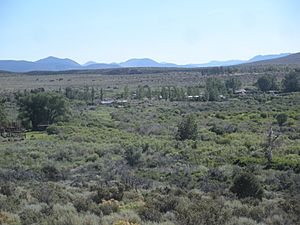Mono City, California facts for kids
Quick facts for kids
Mono City, California
|
|
|---|---|

Mono City from a distance
|
|
| Country | United States |
| State | California |
| County | Mono |
| Area | |
| • Total | 7.84 sq mi (20.30 km2) |
| • Land | 7.84 sq mi (20.30 km2) |
| • Water | 0 sq mi (0 km2) 0% |
| Elevation | 6,768 ft (2,063 m) |
| Population
(2010)
|
|
| • Total | 172 |
| • Density | 21.94/sq mi (8.473/km2) |
| Time zone | UTC-8 (Pacific (PST)) |
| • Summer (DST) | UTC-7 (PDT) |
| ZIP Code |
93541 (Lee Vining)
|
| Area code(s) | 760; 442 |
| GNIS feature IDs | 1667836; 2583083 |
Mono City is a small community in Mono County, California, in the United States. It's located north of Mono Lake, right at the bottom of the tall Sierra Nevada mountains. You can find it where two main roads, U.S. Route 395 and California State Route 167, meet.
Mono City is known as a census-designated place (CDP). This means it's a special area that the government counts for population, but it's not officially a city or town with its own local government. It sits at a high elevation of about 6,768 feet (2,063 meters) above sea level.
In 2020, about 224 people lived in Mono City. This was an increase from 172 people in 2010. If you send mail to Mono City, you should address it to Lee Vining, which is a nearby community.
Contents
Where is Mono City?
Mono City is in the western part of Mono County. It's an important spot because of its location near major roads.
U.S. Route 395 goes north from Mono City for about 19 miles (31 km) to Bridgeport. Bridgeport is the main town and county seat for Mono County. If you go south on US 395 for about 32 miles (51 km), you'll reach Mammoth Lakes, another well-known area.
California State Route 167 heads east from Mono City. This road crosses the wide Mono Valley for about 21 miles (34 km) until it reaches the border of Nevada.
The area of Mono City covers about 7.8 square miles (20.3 square kilometers). All of this area is land, with no large bodies of water inside its boundaries.
Who Lives in Mono City?
The United States Census Bureau collects information about people living in different places. Here's a quick look at Mono City's population.
Population in 2010
In 2010, there were 172 people living in Mono City. Most of the people (about 90.7%) were White. A smaller number of people were from other backgrounds, including Native American and Asian. About 21.5% of the people identified as Hispanic or Latino.
All 172 people lived in homes, not in group housing or institutions. There were 63 households in total. A household is a group of people living together in one home.
- About one-third of the households (33.3%) had children under 18 living there.
- Most households (69.8%) were married couples.
- A few households were led by a single parent.
The average number of people in each household was about 2.73.
The population included people of all ages:
- About 23.8% were under 18 years old.
- About 35.5% were between 45 and 64 years old.
- About 8.7% were 65 years or older.
The average age of people in Mono City was 41.0 years.
Most homes (71.4%) were owned by the people living in them. The rest (28.6%) were rented.
Population in 2000
In 2000, the population of Mono City was 126 people.
- About 8.7% of the population was under 5 years old.
- About 13% were between 5 and 17 years old.
- Most people (68%) were between 18 and 64 years old.
- About 8.7% were 65 years or older.
In 2000, 79% of the homes were owned by the people living in them, and 21% were rented. Experts thought the population would grow to 159 by 2020 and 171 by 2030. The 2020 census showed it grew even more than expected, to 224 people!
Fire Protection
Mono City has its own fire department called the Mono City Fire Protection District. This district was started in 1972 to help keep the community safe from fires. It covers an area of about 0.7 square miles (1.8 square kilometers).
See also
 In Spanish: Mono City para niños
In Spanish: Mono City para niños
 | Anna J. Cooper |
 | Mary McLeod Bethune |
 | Lillie Mae Bradford |



